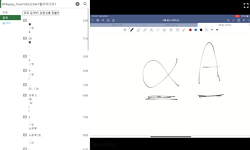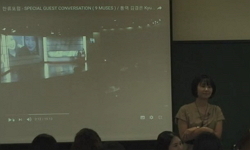This article aims to make a few suggestions in employing the concept of Greek verbal aspect for interpretation of NT. Modern scholarship of Biblical Greek has a position that a choice of a specific tense form of Greek verbs is realized by an author's ...
http://chineseinput.net/에서 pinyin(병음)방식으로 중국어를 변환할 수 있습니다.
변환된 중국어를 복사하여 사용하시면 됩니다.
- 中文 을 입력하시려면 zhongwen을 입력하시고 space를누르시면됩니다.
- 北京 을 입력하시려면 beijing을 입력하시고 space를 누르시면 됩니다.
https://www.riss.kr/link?id=A100091541
- 저자
- 발행기관
- 학술지명
- 권호사항
-
발행연도
2011
-
작성언어
-
-
주제어
헬라어 ; 동사의 상 ; 현저성 ; 성경해석 ; 프롤로그 Greek language ; Greek verbal aspect ; prominence ; interpretation ; Prologue
-
KDC
231
-
등재정보
KCI등재
-
자료형태
학술저널
-
수록면
789-823(35쪽)
-
KCI 피인용횟수
2
- DOI식별코드
- 제공처
-
0
상세조회 -
0
다운로드
부가정보
다국어 초록 (Multilingual Abstract)
This article aims to make a few suggestions in employing the concept of Greek verbal aspect for interpretation of NT. Modern scholarship of Biblical Greek has a position that a choice of a specific tense form of Greek verbs is realized by an author's perspective on an event, and so a reader can find the author's intention by analysing Greek verbal aspects in the text. If we agree that Greek verbal aspects have their own meanings, a choice of aspects depends on author's subjective decision and a choice of a specific aspect may indicate abandonment of other aspects by the author, we cannot totally deny an opinion that Greek verbal aspects can be used as a tool for interpretation. Nevertheless, we should concern with a few limitations of this opinion. Firstly, scholars often claim different conclusions in kinds, numbers and functions of Greek verbal aspects though they agree in some points. Secondly, while we cannot assert that a choice of verbal aspect often reflects the author's intention because Greek verbal aspects are considered to be chosen by author either consciously or unconsciously, we should remind that there are a number of literary devices that directly transfer author's intention. At the point that these literary devices are always consciously chosen by author, they must have a priority to Greek verbal aspects in interpretation of a text (if they appear or are recognized). In addition, but as a fundamental problem, we may point out that the study of Greek verbal aspect has not been completed yet. Many studies are based on limited data, especially too much on writings of NT. This also means that theories of Greek verbal aspects are not solid to be used as a tool for interpretation. Thus, the use of Greek verbal aspects as a tool for interpretation should be based neither on a theory of a scholar, nor on a total of all scholars. Instead, before a more comprehensive study appears, we should put a different weight on what all scholars perfectly agree (more) and on what they show different opinions (less). And, we should pay attention to literary devices rather than to Greek verbal aspects in interpreting a text. In terms of these problems, this article provides some points that all scholars agree in studies of Greek verbal aspects and suggests how Greek verbal aspect should be understood in relation with literary devices in a text.
참고문헌 (Reference)
1 고병찬, "요한복음 ‘프롤로그’(1:1-18)의 중심축으로서의 ‘믿음’: 복합 역교차 구조 분석" 한국복음주의신약학회 9 (9): 43-65, 2010
2 박윤만, "신약성서 헬라어의 현저성 표지들(Prominence Markers)" 한국복음주의신약학회 9 (9): 309-334, 2010
3 우상혁, "성경 헬라어 상 연구: 칠십인경 중심으로" 한국복음주의신학회 60 : 59-83, 2011
4 박윤만, "동사 상과 빌레몬서 담화 처리" 한국복음주의신약학회 10 (10): 941-976, 2011
5 이상일, "“말하다” 동사의 분사형의 한국어 번역에 대하여" 한국복음주의신약학회 9 (9): 517-539, 2010
6 R.C. Campbell, "Verbal Aspect, the Indicative Mood, and Narrative: Soundings in the Greek of the New Testament" Peter Lang 2007
7 S.E.Porter, "Verbal Aspect in the Greek of the New Testament with Reference of Tense and Mood" Peter Lang 1993
8 "Verbal Aspect in the Book of Revelation: The Function of Greek Verbal Tenses in John's Apocalypse" Brill 2010
9 D. Mathewson, "Verbal Aspect in the Apocalypse of John: An Analysis of Revelation 5" 50 : 58-77, 2008
10 B.M.Fanning, "Verbal Aspect in New Testament Greek" Clarendon Press 1990
1 고병찬, "요한복음 ‘프롤로그’(1:1-18)의 중심축으로서의 ‘믿음’: 복합 역교차 구조 분석" 한국복음주의신약학회 9 (9): 43-65, 2010
2 박윤만, "신약성서 헬라어의 현저성 표지들(Prominence Markers)" 한국복음주의신약학회 9 (9): 309-334, 2010
3 우상혁, "성경 헬라어 상 연구: 칠십인경 중심으로" 한국복음주의신학회 60 : 59-83, 2011
4 박윤만, "동사 상과 빌레몬서 담화 처리" 한국복음주의신약학회 10 (10): 941-976, 2011
5 이상일, "“말하다” 동사의 분사형의 한국어 번역에 대하여" 한국복음주의신약학회 9 (9): 517-539, 2010
6 R.C. Campbell, "Verbal Aspect, the Indicative Mood, and Narrative: Soundings in the Greek of the New Testament" Peter Lang 2007
7 S.E.Porter, "Verbal Aspect in the Greek of the New Testament with Reference of Tense and Mood" Peter Lang 1993
8 "Verbal Aspect in the Book of Revelation: The Function of Greek Verbal Tenses in John's Apocalypse" Brill 2010
9 D. Mathewson, "Verbal Aspect in the Apocalypse of John: An Analysis of Revelation 5" 50 : 58-77, 2008
10 B.M.Fanning, "Verbal Aspect in New Testament Greek" Clarendon Press 1990
11 "Verbal Aspect and Non-Indicative Verbs: Further Soundings in the Greek of the New Testament" Peter Lang 2008
12 S.E. Porter, "The Language of the New Testament: Classic Essays" JSOT Press 1991
13 Morris, "The Gospel according John, revised ed" William B. Eerdmans Publishing Company 73-, 1995
14 R. Decker, "Temporal Deixis of the Greek Verb in the Gospel of Mark with Reference to Verbal Aspect" Peter Lang 2001
15 A.J.Malherbe, "Social Aspects of Early Christianity" Fortress Press 1983
16 L. Miller, "Salvation-History in the Prologue of John: The Significance of John 1:3/4" E. J. Brill 17-44, 1989
17 M. Silva, "Response to Fanning and Porter on Verbal Aspect, in Biblical Greek Language and Linguistics: Open Questions in Current Research" Sheffield Academic Press 78-79, 1993
18 Ph. W. Comfort, "New Testament Text and Translation Commentary: Commentary on the Variant Readings of the Ancient New Testament Manuscripts and How They Related to the Major English Translation" Tyndale House Publishers, Inc. 252-253, 2008
19 S.E. Porter, "Language and Translation of the New Testament, in The Oxford Handbook of Biblical Studies" Oxford University Press 193-, 2008
20 S.E. Porter, "In Defence of Verbal Aspect, in Porter and Carson, Biblical Greek Language and Linguistics" 26-45,
21 S.E. Porter, "Idioms of the Greek New Testament, 2nd ed" Sheffield Academic Press Ltd. 1999
22 D.B. Wallace, "Greek Grammar beyond the Basic: An Exegetical Syntax of the New Testament with Scripture, Subject, and Greek Word Indexes" Zondervan Publishing House 503-504, 1996
23 "Basics of Verbal Aspect in Biblical Greek" Zondervan Publishing House 2008
24 B.M. Fanning, "Approaches to Verbal Aspect in New Testament Greek: Issues in Definition and Method, in Porter and Carson, Biblical Greek Language and Linguistics" 42-62,
25 K.L.McKay, "A New Syntax of the Verb in the New Testament" Peter Lang 1994
26 F. Blass, "A Greek Grammar of the New Testament and Other Early Christian Literature" University of Chicago Press 649-650, 1961
동일학술지(권/호) 다른 논문
-
복음서와 사도행전에 사용된 헬라어의 부가적 용법의 분사에 대한 연구
- 한국복음주의신약학회
- 정창욱(Jung, Chang Wook)
- 2011
- KCI등재
-
- 한국복음주의신약학회
- 김문현(Kim, Moon Hyun)
- 2011
- KCI등재
-
- 한국복음주의신약학회
- 서동수(Seo, Dong-Su)
- 2011
- KCI등재
-
- 한국복음주의신약학회
- 문병구(Moon, Byeung Goo)
- 2011
- KCI등재
분석정보
인용정보 인용지수 설명보기
학술지 이력
| 연월일 | 이력구분 | 이력상세 | 등재구분 |
|---|---|---|---|
| 2023 | 평가예정 | 재인증평가 신청대상 (재인증) | |
| 2020-01-01 | 평가 | 등재학술지 선정 (재인증) |  |
| 2019-12-01 | 평가 | 등재후보로 하락 (계속평가) |  |
| 2016-01-01 | 평가 | 등재학술지 유지 (계속평가) |  |
| 2012-01-01 | 평가 | 등재학술지 선정 (등재후보2차) |  |
| 2011-01-01 | 평가 | 등재후보 1차 PASS (등재후보1차) |  |
| 2009-06-19 | 학회명변경 | 영문명 : 미등록 -> Korean Evangelical Society of New Testament Studies |  |
| 2009-01-01 | 평가 | 등재후보학술지 선정 (신규평가) |  |
학술지 인용정보
| 기준연도 | WOS-KCI 통합IF(2년) | KCIF(2년) | KCIF(3년) |
|---|---|---|---|
| 2016 | 0.48 | 0.48 | 0.38 |
| KCIF(4년) | KCIF(5년) | 중심성지수(3년) | 즉시성지수 |
| 0.33 | 0.27 | 0.729 | 0.2 |




 KCI
KCI 스콜라
스콜라






